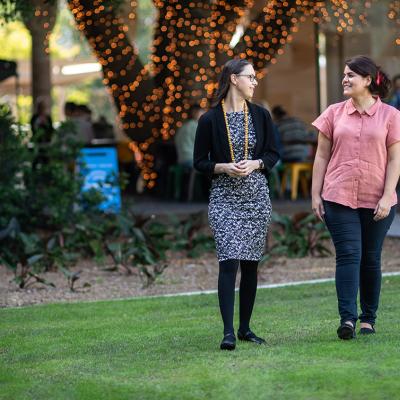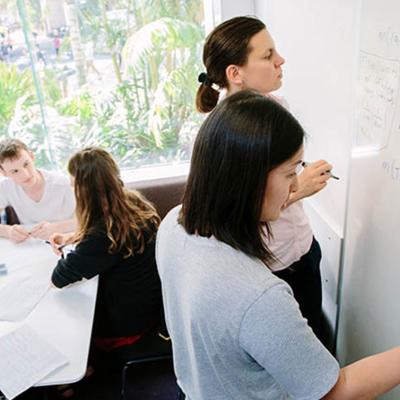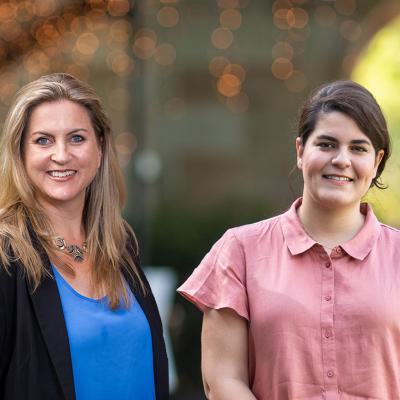We asked two recent Master of Business Analytics graduates to reflect on their experience and career benefits of the program.
Kyara Ramraj and Brittany Suess explain why they decided to study business analytics and what it’s like studying this 100% online postgraduate program.
Why the Master of Business Analytics?
After completing an undergraduate degree in computer engineering, Kyara started work as a graduate in telecommunications, then spent 6 years in management consulting. She believes it’s important for all professionals to continuously upskill and expand their knowledge and skillset, but particularly so when working in the technology industry.
"I believe we not only need to sharpen our tool set regularly, but we need to add new tools to the toolbox and learn the latest techniques as well," she says.
That’s why she decided to enrol in UQ’s Master of Business Analytics.
"This program teaches the latest concepts and techniques and combines data analytics with business and management," says Kyara.
"I require this variety to pursue my goals."
Pursuing continuous learning, whether formal or informal, is also something Brittany sees as essential to stay up to date with the pace of technology change. After completing an undergraduate degree in business and a postgraduate diploma in data science, Brittany has worked in various data analytics roles within the government sector.
Wanting to build on her graduate diploma, Brittany enrolled in UQ’s Master of Data Science. While she learnt a lot of new skills, she found it challenging to study on campus and attend classes during business hours while working full time.
That’s why she switched to the Master of Business Analytics, which is taught 100% online, when it launched.
"I discovered the program still contained many practical data related courses that I wanted, including machine learning and social analytics, as well as business-oriented courses including data monetisation," she says.
“The courses in the program have been developed purely for the program – this makes sure the course content is relevant and current.”
What is business analytics?
Business analytics is the process of studying raw data to find patterns and draw out meaningful insights that can be used to improve business operations. Learn more about the importance of data management for businesses.
What’s it like to study the Master of Business Analytics?
Studying 100% online allowed Kyara to study while continuing full-time work at a niche business analysis consulting company.
"All lectures are after regular working hours and are recorded for those who can’t join due to personal commitments, which means you can study at your own pace," she says.
"I got plenty of quality time with my lecturers, who were always open to consultation. This made learning personalised and very supportive."
According to Kyara, every industry has the following elements: a strategy, data, and digital transformation aspirations.
"The Master of Business Analytics covers each of these topics, making it highly relevant to any organisation seeking to stay relevant or advance technologically," she says.
Kyara found the content of the program highly relevant to her work.
"It’s forward-thinking and innovative, with a great blend of academic study and application to real industry challenges – challenges that are brought about by new technologies and ways of working," she says.
Brittany agrees, saying the program focuses on 'genuine assessments'. Rather than writing a stock standard report, Brittany explains you’ll “create outputs like you would expect to undertake in industry.”
"There’s room for creativity, and to put your own personal direction into things," she says.
"Often, you can apply the assessment items to your current industry or industry of choice."
What’s next for these business analytics graduates?
Kyara hopes to expand her career in business analytics, specifically in applying digital transformation, AI and product development concepts.
"My job is predominantly client-facing and every project I’m on is unique," she says.
"I’m exposed to a range of industries and business problems, which makes my career interesting yet quite challenging."
"Throughout my studies, I have already been able to apply the knowledge I have learnt in the program to my projects at work and in real time. This has really empowered me as a professional. It has increased the quality of my deliverables and improved my confidence in speaking to clients about their challenges and potential solutions."
Currently working within state government in a data-focused role, Brittany is keen to see what career progression opportunities her new qualification will give her.
"I feel the knowledge and skills I have learnt throughout the program will continue to be an asset in my career," she says.
"Analytics skills are highly transferable across different industries and different roles. In this sector, I feel there are a lot of opportunities to apply data and analytics skills to real-world problems which improve operations and services."
What advice would you give to other students thinking about studying this program?
Brittany’s advice
"If you're unsure about the 3-year duration of the master’s program, you could consider testing out the program with the 1-year Graduate Certificate in Business Analytics. This allows you to be awarded with an interim qualification that can be used for career progression. You then have the option of continuing your studies by enrolling in the full master’s program and can apply for credit for the courses you’ve already completed."
Kyara’s advice
"Part-time study can be challenging, especially if you work full time. The learning team are extremely supportive, and the material is easily accessible. However, it is important to manage your time and proactively plan by quickly identifying when assessments are due, raising questions on them and setting aside time to get them done."
Learn how a Master of Business Analytics could help you achieve your career goals.







